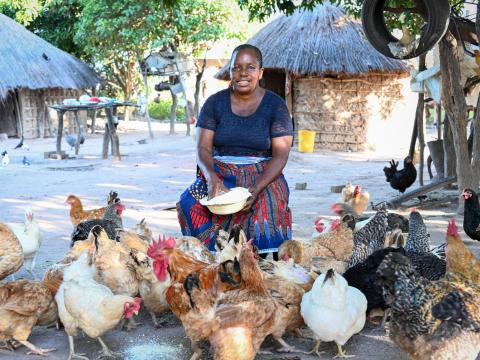Empowered World View transforms a woman's life

By Agatha Mali, Communications Officer, Zambia.
“If it were not for Farming God’s Way, my family and I would have continued to live a life of suffering,” says 55-year-old Leni Chisamu
Leni and her husband, Mailoni Chisamu, 61, have lived their whole lives trying different businesses to make ends meet but have failed to earn a stable income and provide for their six children.
In 2017, World Vision conducted training under the Empowered World View, and Leni was one of the women who benefited from the training.
Through the training, Leni had an opportunity to learn many ways on how she could enterprise and make money without facing the many challenges she faced in the past.

“I was tired of begging for food from other people, and I was at the point of giving up when World Vision came to train us in a different way of making money using our available resources and knowledge,” says Leni.
After many years of a failed farming business, Leni received Farming God’s Way training. As a result, she learned conservation farming, which was a life-changing moment for her and her family.
A few months after the training, Leni grew maize on the same land she had failed to yield anything years ago. “I had doubts if I would have a good harvest, and at the same time, I was hopeful that I would have a good harvest,” says Leni.
Leni says because of Farming God’s Way, she got high yields and returns after cultivating on their small portion of land.
“We were able to sell some bags of maize and used the money to buy food and other necessities for our household. My husband and I then planned to cultivate a bigger portion of land using the same farming method in the next farming season,” she says.
In the same year, World Vision introduced a savings group model and trained Leni and other community members on the importance of saving.
“I did not have any knowledge of the importance of saving. In the past, we used to depend on hand-to-mouth,” she says. My husband and I spent all our money and did not think of the future. It was even worse when we were hit by emergencies that we had to beg for support from other people.”
After selling a few bags of maize, Leni saved some money with her savings group and got a loan that she used to buy more farming inputs.
“We ventured into soya bean farming. This was a turning point in our lives. We had a good harvest and sold thirty-six bags of soya beans at K450.00($28.00) per 50 kilograms bag,” says Leni.
And from their farming earnings, Leni and her husband Mailoni have been financially supporting their children’s education.
“Currently, we are paying for our daughter, who is practicing nursing in college,” she says with a smile.
With the increase in their crop production, business have been able to diversify into chicken production. Leni has also received training from World Vision in village chicken production.
“Using the transport allowance refund I received, I bought a special breed of 100 Sasso chickens, 10 of them died and I was able to resell 43, and we are now remaining with 47 that have also been laying eggs that we sell,” she says.
She adds, “Through the chickens, we now can afford to at least have a decent meal as with the eggs produced and the chicken meat itself, unlike in the past when we could only eat chicken once or twice in a year.”
Using her experience, Leni is helping to bring transformation to her community by training and sharing the knowledge she received from World Vision with 36 farmers.